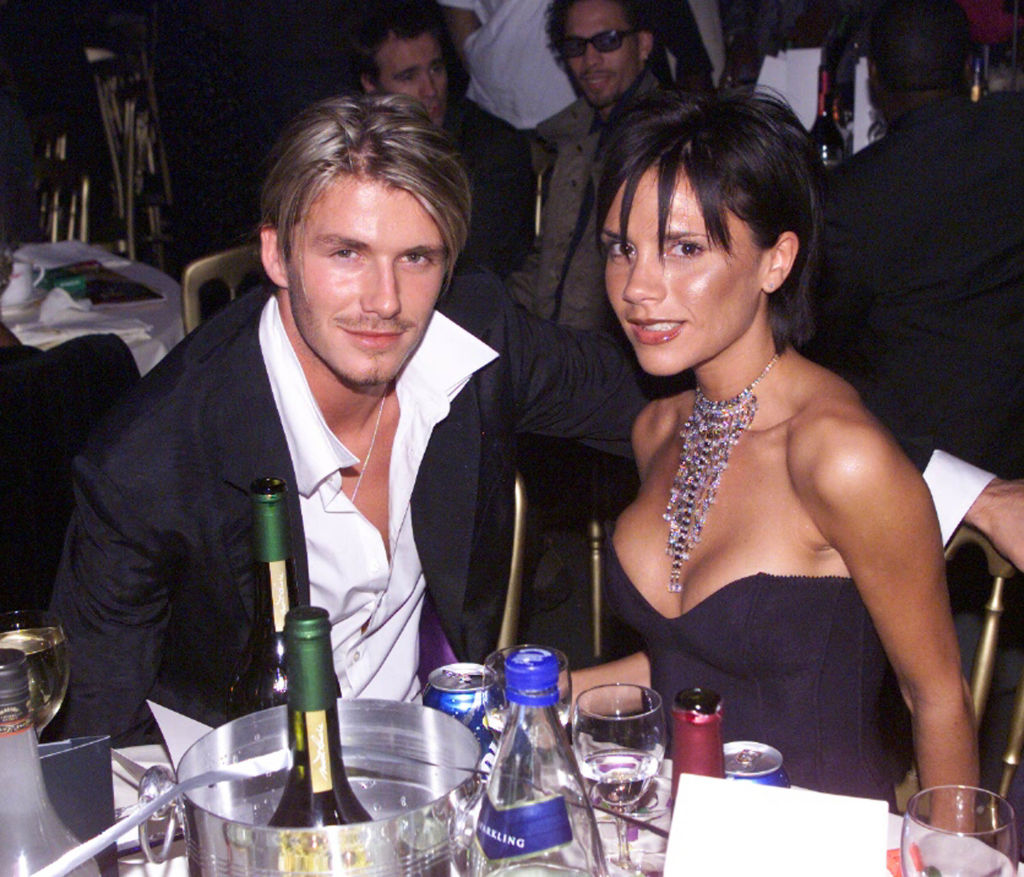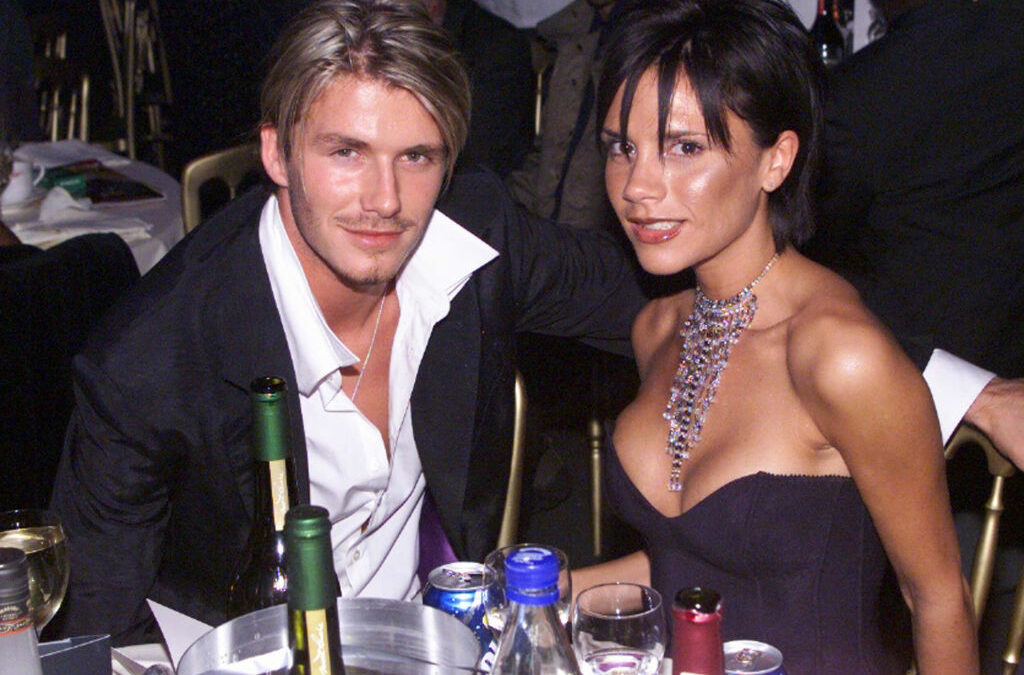How 25 years of Brand Beckham shaped pop culture forever
Words by Polly Dunbar

In 1999, Prince Edward married Sophie Rhys-Jones at Windsor Castle, but it was a relatively modest affair compared to that year’s real royal wedding: the union of David and Victoria Beckham at 15th century Luttrellstown Castle in Dublin.
Posh’n’Becks’ big day, on July 4, had it all: a Robin Hood theme, a Vera Wang dress with a 20ft veil, matching purple outfits for the reception (about which David later groaned, ‘What was I thinking?’), a cake topped with a nearly-nude sculpture of the couple and, of course, those unforgettable red and gold thrones.
25 years later, those two young stars at the peak of their thrilling early fame could have ended up divorced and remarried twice over by now. And yet, last week, they celebrated their milestone anniversary as any self-respecting multi-millionaire should, on a yacht in Sardinia. On their wedding day, however, Imageall those years ago, the Spice Girl and hero Manchester Utd footballer were 24 years old, new parents to Brooklyn and the biggest celebrities in Britain. Their adoration for one another was obvious, yet few would have bet on them surviving to celebrate their silver wedding anniversary, let alone becoming the country’s ultimate power couple, with a combined fortune of £455 million.
‘As a brand, they’re as ubiquitous as Heinz baked beans or HP sauce,’ says brand and culture expert Nick Ede. ‘They’re a fundamental part of British culture. They’ve both achieved a lot professionally, but ultimately, they’re as successful as they are because we like them.’
The path to national treasure status is rarely smooth. From the moment Victoria was spied leaving David’s house, dressed in her all-black Posh uniform of tight skirt, little cardi and big sunglasses, in 1997, weeks after the pair first met in the players’ lounge at Old Trafford, their relationship has been tabloid catnip – with their lows as well as highs played out publicly.
There was a bidding war for exclusive rights to cover their wedding, with OK! winning after coughing up £1 million. Martin Townsend, the magazine’s editor, later confessed the offer was based on rumours of a big money offer by The Sun, which proved not to be true. Alan Edwards, the Spice Girls’ publicist, ‘nearly fell off his seat’ when he heard the astronomical sum. It was worth it, though: in what Townsend called ‘the golden age of celebrity’, the issue sold 1.7 million copies.
‘‘It felt like the world was against us. And here’s the thing – we were against each other…’
The day itself was, in the words of former Sun showbiz editor Dominic Mohan, ‘an absolute bunfight’, with all the helicopters flying overhead, filled with the press trying to get shots of the wedding, like ‘something from the film Good Morning, Vietnam.’ 236 security guards were hired to try to keep control of the hoardes of fans.
All that wealth and glamour made the Beckhams an obvious target for tall poppy syndrome, that very British penchant for building up celebrities just to knock them down. An early sign that any hint of deviation from squeaky clean would be punished came when David was sent off for kicking Argentinian player Diego Simeone during a World Cup match in 1998; supporters back home were filmed burning effigies of Beckham. Victoria was mocked relentlessly as she tried to launch her solo career, for everything from her singing abilities to a lip ring which turned out to be fake.
By far the couple’s biggest crisis came in 2004, when Rebecca Loos, David’s personal assistant at Real Madrid, claimed she’d had an affair with him the previous year. In last year’s Netflix documentary Beckham, Victoria admitted: ‘It felt like the world was against us. And here’s the thing – we were against each other, if I’m being completely honest… I can’t even begin to tell you how hard it was and how it affected me.’
They battled through and against the odds, Brand Beckham continued to grow. At 50, Victoria’s fashion empire has experienced hiccups but is now flourishing, with her makeup range in particular proving phenomenally successful: one of her iconic jewel-coloured Satin Kajal eyeliners is sold every 30 seconds. David’s commercial interests include co-owning Inter-Miami football club and his longstanding deal with Adidas.
So how have they done it? ‘They’re very family orientated and they’ve taken us with them on their family’s journey, from the wedding deal with OK! onwards,’ says Ede.
The Netflix documentary, and subsequent Super Bowl advert, in which David teased Victoria, telling her to ‘be honest’ when she insisted their families were ‘very working class’ despite her dad picking her up from school in a Rolls Royce, was a masterstroke – as is the couple’s strategy of using social media to give the public intimate glimpses of their lives, such as Victoria posting a picture of David doing a topless workout, with the cheeky caption, ‘You’re welcome!’ They’re incredibly famous, yet we feel like we know them.
‘Everything they’ve done has had an element of tongue-in-cheek, even the thrones, and the documentary showed they have a great sense of humour,’ says Ede. ‘In person, Victoria is hilarious, and genuine – her friendships with women like Eva Longoria are real, and deep. Doing her own videos for her makeup brand is clever, because being herself works for her. And now we’re seeing Brooklyn show that ability to laugh at himself, too, with the advert for Booking.com, where he’s referencing everyone questioning what he does.’
How many people would bet against Brand Beckham still going strong on their golden wedding anniversary in 25 years’ time?
Photo: Getty

